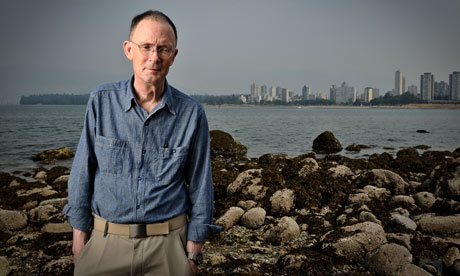
It's probably the case that even more people know that William Gibson coined the term "cyberspace" than have read Neuromancer (more than 6.5 million copies sold), his 1984 novel that made the word famous. And I'm sure more people associate the term with him than have read "Burning Chrome", the story in which it first appeared in 1981. It's a great word, so it's hardly surprising it was taken up to describe the virtual space of computer networks outside science fiction, a space now so real that the Pentagon recognises it as a fifth military domain (the other four being land, sea, air and outer space). In many ways, cyberspace as we know it isn't much like cyberspace as Gibson imagined it 30 years ago, but the resemblance is close enough for him to have acquired a reputation as a prophet of the information age.
As the pieces gathered in Distrust That Particular Flavor make clear, it's not a reputation he's entirely comfortable with. In a talk he gave at Book Expo in New York in 2010, published here for the first time, he joked that Neuromancer has "a complete absence of cellphones, which I'm sure young readers assume must be a key plot point" and pointed out that "imaginary futures are always, regardless of what the author might think, about the day in which they're written. Orwell knew it, writing Nineteen Eighty-Four in 1948" – the year, as it happens, that Gibson was born – "and I knew it writing Neuromancer".
Orwell is one of the acknowledged influences Gibson returns to repeatedly here. Others include HG Wells, Jorge Luis Borges and William Burroughs. There are also pieces on musicians (Steely Dan are described, not entirely convincingly, as "among the most genuinely subversive oeuvres in late-20th-century pop") and visual artists, including Greg Girard, whose photographs of the demolition of old Shanghai and the "shoals of cheap-ass concrete thunderheads" being built in its place are "almost more than I can bear to contemplate".
"I know little more about Shanghai than these images," Gibson writes, but there are other pieces here on cities he knows better: the ones he loves – Tokyo, London, New York – and one he loathes, Singapore, which he calls "Disneyland with the death penalty". After Wired ran this article in 1993, the magazine joined the ranks of those banned by the Singaporean government, Gibson says in a short postscript. These brief afterwords – conversational, self-deprecating and no less thoughtful than the writing they comment on – are one of the collection's principal pleasures; many of the individual pieces, after all, are already available online.
In 1989, Gibson wrote an article for Rolling Stone on the subject of "the net": "As a science-fiction writer, I'm sometimes asked whether or not I think the net is a good thing." In the postscript to the piece in this volume, he writes: "What I don't recall, quite, is what I would have imagined 'the net' to be, at that point, however freely I tossed the term around for Rolling Stone." The piece includes two vivid memories from Gibson's childhood and youth: one of listening to Chubby Checker on a crystal "Rocket Radio", which "requires no battery at all", using "a quarter mile of neighbour's rusting fence for an antenna"; the other of finding "60 feet of weirdly skinny magnetic tape snarled in roadside Ontario brush".
He says more than once in the collection that he believes "that all cultural change is essentially technology-driven". But as well as the pieces here on new technology – the internet, digital film – Gibson shows an abiding interest in old, obsolete or obsolescent technology (though it isn't true, he says, despite the many newspaper articles that repeat the assertion, that he still writes on a manual typewriter). The longest essay in the book, "My Obsession", written for Wired in 1999, describes a year he spent in the late 1990s collecting mechanical watches, compulsively bidding for them on eBay. Part of their appeal lay in their being "so brilliantly unnecessary. Any Swatch or Casio keeps better time," he writes. But "the idea of the Collectible", he suggests, is a "basic mammalian response to the bewildering flood of sheer stuff we produce".
A semi-autobiographical character in one of his early stories, "The Winter Market", is an artist who works in "garbage, kipple, refuse, the sea of cast-off goods our century floats on". The tension between the urge to accumulate stuff and the desire to escape from it is everywhere in Gibson's writing, fiction and non-fiction. He's given up on eBay these days; he's a must-follow presence on Twitter instead. And last September, he tweeted: "Saw my first discarded flatscreen TV, put out to be collected as trash."

